Arriving at Harry Potter and the Deathly Hallows—Part 2 was awful because it really felt like the end of everything. The books were complete, the films were soon to be over. There was a lot riding on the final film, which appropriately billed itself in posters and trailers as “The Battle of Hogwarts: The Movie.”
The film was critically lauded for the most part, but for fans of the book it strikes an odd balance between doing some things perfectly and some things… oddly. Awfully. Disappointingly. The performances are gorgeous, the spectacle is right on, the visuals are beautiful. But there are misses in this film that prod at your sides like weird itchy tags on new clothes.
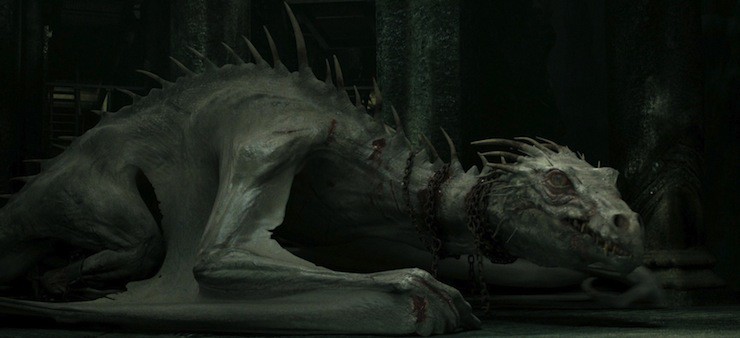
The theft from Gringotts sequence works well overall, the depiction of the dragon in particular being quite impressive because you can tells it has been abused just by looking at it. The sight is deeply upsetting. Helena Bonham-Carter playing the part of Hermione-under-Polyjuice-Potion is just excellent. (She apparently watched Emma Watson act out her lines so she could mimic her exactly. Actors on set reported forgetting that it wasn’t simply Emma under makeup.) The vault is claustrophobic and the action that follows puts us right back into the story, which can be a hard thing to pick up after a cliffhanger.
We do have a funny continuity problem from book to film here—when Ron asks Harry how he’ll know what the Hufflepuff Cup looks like, Harry claims he has seen it before. But since we never got the Riddle flashbacks in The Half-Blood Prince, that doesn’t make any sense in the context of the movies.
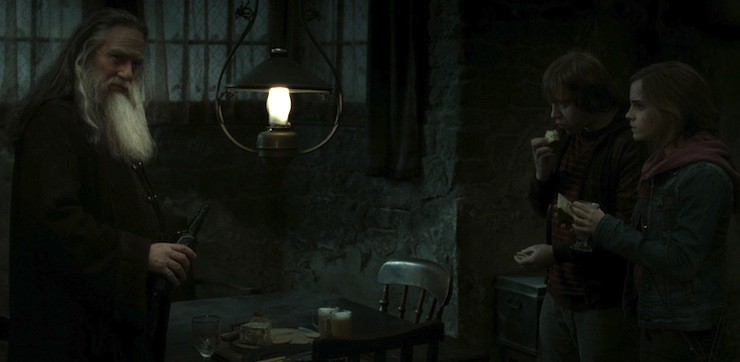
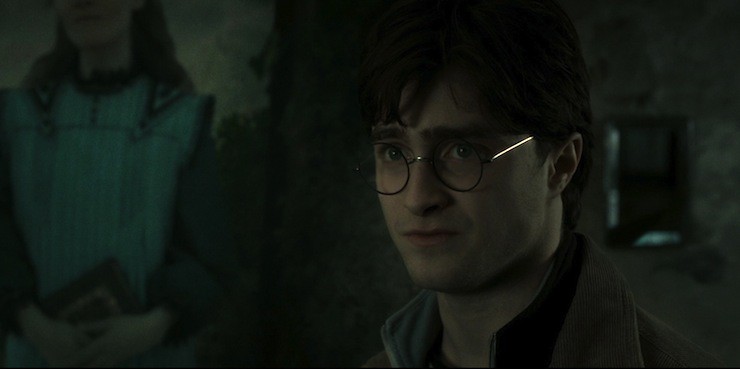
We have Ciaran Hinds as Aberforth Dumbledore, and while it never quite grabs me so much in the book, something about the tension between Hinds and Radcliffe makes their scene really sing in the film. He’s not just gruff and irascible, Hinds plays Aberforth with a tangible bitterness that makes Harry’s outburst toward him feel truly earned. When he comes right out and says “I don’t care that you’ve given up,” you can’t help but punch the air in agreement. It’s a place where Harry truly comes off like an adult, and I find myself being proud of both Harry and Daniel Radcliffe at the same time.
The return to the school is where things get interesting. The fight between McGonagall and Snape is far more public, and frankly badass as hell. (Alan Rickman reported having trouble with this scene, partly due to the difficulty of making wand-fighting look truly menacing, and partly due to the fact that he had worshipped Dame Maggie Smith as an actor for most of his life, and couldn’t really conceive of giving her a hard time.) But then we arrive at the point where Voldemort gives his first surround sound announcement, encouraging them to give over Harry, and Pansy Parkinson agrees… to which McGonagall’s response is to direct the entire Slytherin House to their common room in the dungeons.
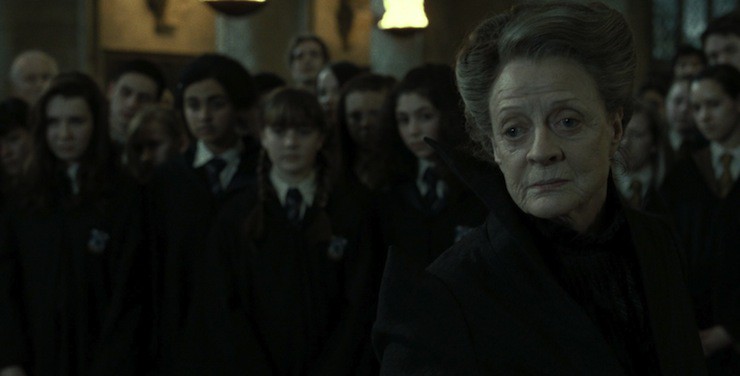
Sure, it may seem simpler than discussing evacuation plans for the school, but that action is deeply unethical regarding the treatment of the student body. Those kids could have been hurt stuck in that common room during a full-scale war, and they were ordered there under duress. Sometimes films have to compress bits of story, but that was one place where it should not have occurred, and I’m sort of surprised that it didn’t occur to anyone.
The section where they prepare the castle for war, with the moving statues and the protective spell work, and all the teachers and Order members working together, it moves me to tears every single time. This is partly due to the score by Alexandre Desplat, who easily created one of the greatest soundtracks for a war sequence that I’ve ever heard. It’s so affecting that I often super-impose it over books that I’m reading. (I did this for The Hunger Games, which made the actual soundtrack for the Hunger Games film strangely disappointing to me the first time around.)
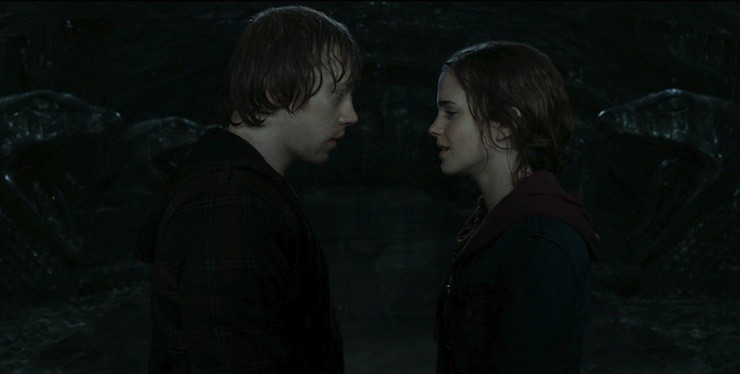
We sort of awkwardly wedge in Ron and Hermione’s first kiss, by having them destroy a Horcrux in the Chamber of Secrets and then get all overcome with emotion. It’s still played adorably, but I feel like there are too many points where the film misses the chance to lighten the mood the way Rowling does, and this is one of those places.
We have another bit of awkwardness where Crabbe was not available for the movie because the actor who portrayed him had been arrested for drug possession. This led to replacing his character with Blaise Zabini during the Room of Requirement scene, and Goyle casting and dying in the Fiendfyre. It’s mostly awkward because you can’t help but wonder what’s happened to Crabbe—did Draco just not ask him along? Was his family another being held hostage by Voldemort? Is he dead? On the other hand, it’s nice to see more of Blaise. (He’s a character I always wanted more information on, really.)
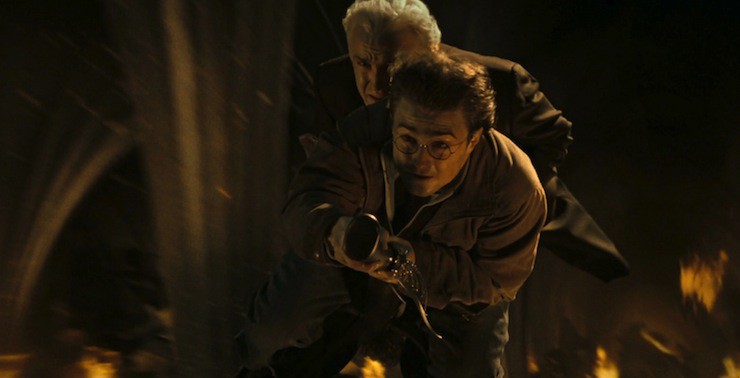
Snape’s death is a completely different animal in the film. Alan Rickman has spent eight movies imbuing the character with far more subtlety than the books contain (he was told very early on by Rowling what Snape’s backstory was and the various series directors often had to defer to him in how he chose to play a scene, knowing that he had extra knowledge), and his passing feels more emotional in every possible way. Rather than simply brimming over with memories for Harry to bottle, he literally cries them out. When he searches Harry’s face to see Lily’s eyes, it does seem that perhaps he is seeing Harry right for the first time. These are choices that only come into play when an actor decides to work them out. The memories that Harry gets the chance to look back on seal the deal. We watch Snape crying over Lily’s dead body and we can’t not feel bad for him, even if with don’t agree with his actions beforehand. When Snape realizes that Dumbledore had always planned for Harry to die, the horror is palpable on his face. Everything lands differently because we are relating to him.
I’ve never been overwhelmed with sorrow for Severus Snape. But Alan Rickman as Severus Snape saddles the audience with more than we bargained for because he was a superb actor of the very highest caliber. (Was. It’s so depressing to use the past tense now.) You know you’re observing a craft master when you find yourself feeling for a character for whom you would normally never sympathize in real life. He was a damned inspiration to watch.
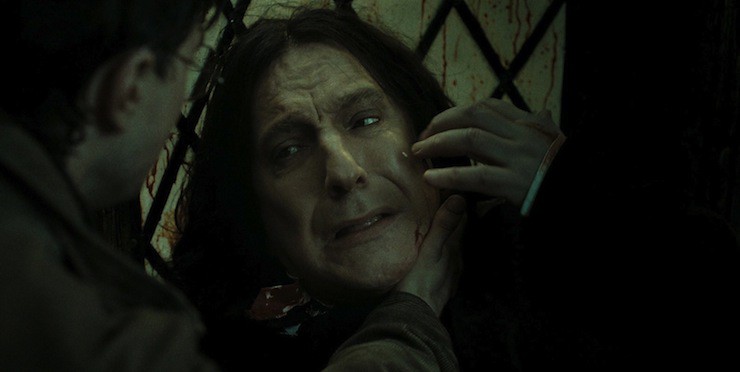
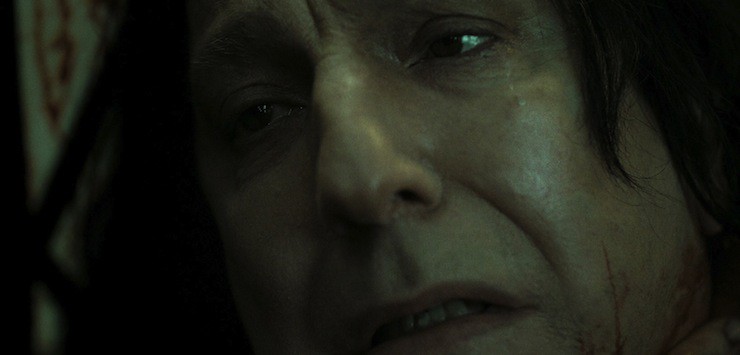
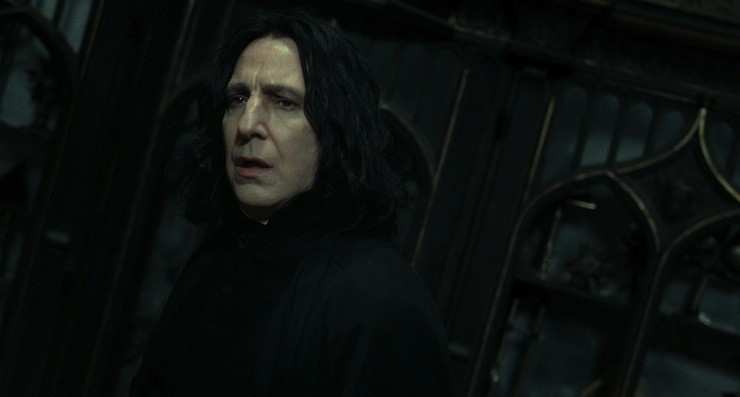
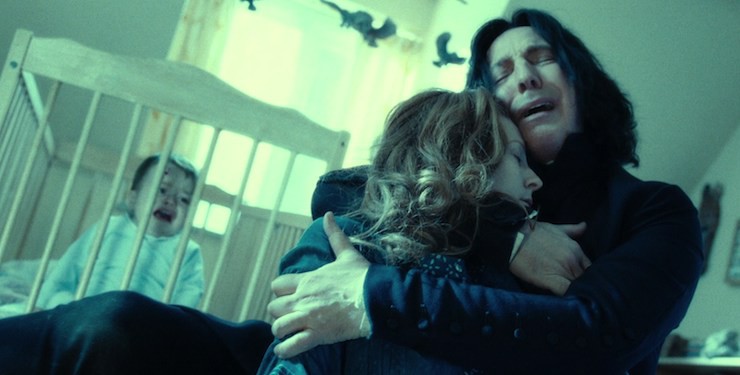
And following this sequence, it all gets turned over to Daniel Radcliffe, who grew into this part better than nearly any child actor I’ve ever seen the world over. What a strange place to be in, cast as one of the most important pop culture characters of the century at ten years old, and managing to grow and improve and embody that part. In a very real way, Daniel Radcliffe kind of was Harry Potter. Someone knocked on his door and said “Yer a superstar, Daniel,” and he had to take that in stride and survive a decade of filmmaking—and then all the years after it, where the world halfway expected him to crash and burn. He and Watson and Grint deserve medals (or something more impressive than medals) for making it all the way through, and even more for continuing on this path after such a ridiculous amount of exposure throughout childhood.
So Harry heads into the woods and Harry faces Voldemort and Harry dies. His scene with Dumbledore is another place where I’m super insistent on Gambon being the right pick for this character. He’s so divinely blithe and sunny the whole way through. The set is dressed gorgeously, the color palette is spot on.
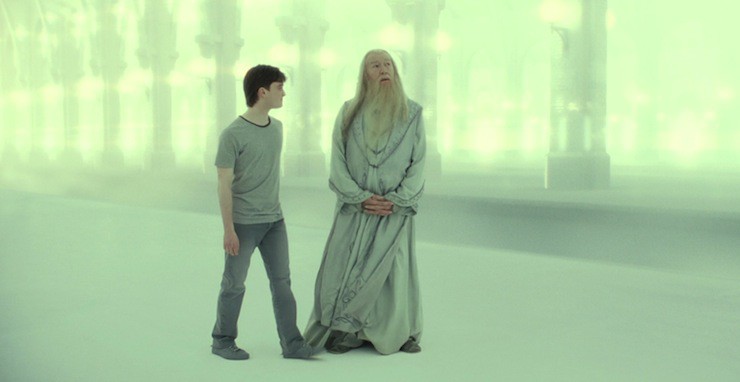
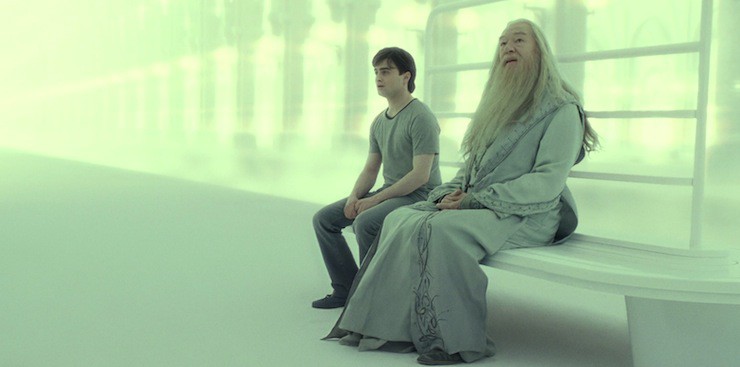
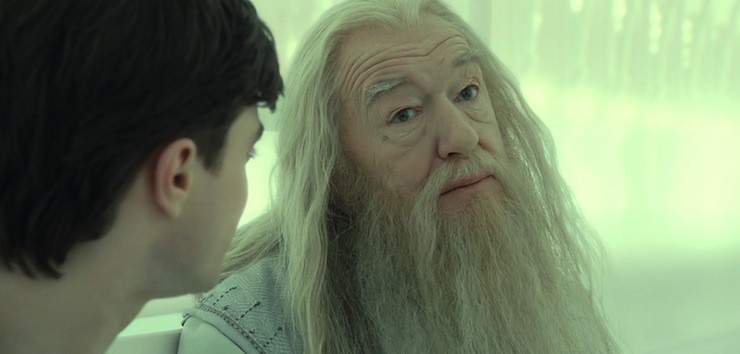
And then we get to the final battle sequence and everything gets all… squidgy. I mean, there are things I love about the interpretation, and things I really don’t love, and it all happens a bit too fast. Voldemort calls out anyone who should be on their side, Draco shuffles over for awkward hugs, and the Malfoys simply hightail it away from the scene. It’s not bad as far as exits go, but I wish they’d had them stay they way they did in the book because we get robbed of the relevance of them sitting in the Great Hall with all the survivors at the end. In addition, there was a filmed scene that they axed from the final cut, which would have painted the whole thing differently; in the original version, once it was clear that Harry is alive, Draco was meant to defy the Death Eaters and toss Harry his wand. On the one hand, I’m sort of against Draco being that openly defiant because it’s counter-intuitive to his character. On the other hand, in a film where the entirety of Slytherin has been relegated to the dungeon that would have been an excellent pointed choice. So maybe I wish it had made the cut? I don’t know.
Neville makes this grand speech about how it doesn’t actually matter if Harry’s dead because they’re in a damn war and that’s what happens, and it doesn’t mean that they have to stop fighting. And this speech is actually super smart in terms of being a rallying point, maybe even better than Neville’s original lines in the book. It shows a maturity of thought for Neville, who knows precisely what it’s like to lose people in war, and knows that the world keeps turning regardless. And for someone who the prophecy almost applied to, it’s rings even truer.
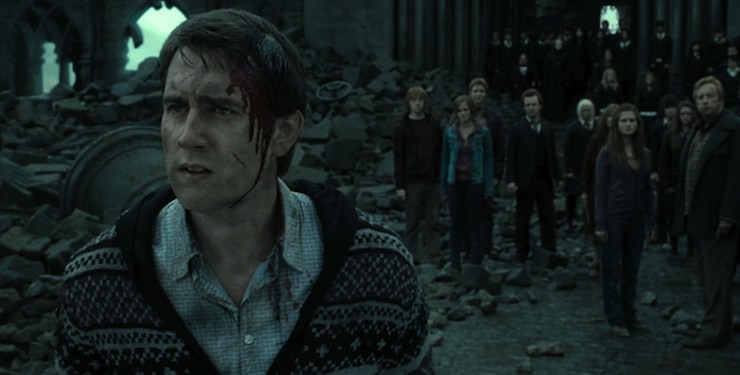
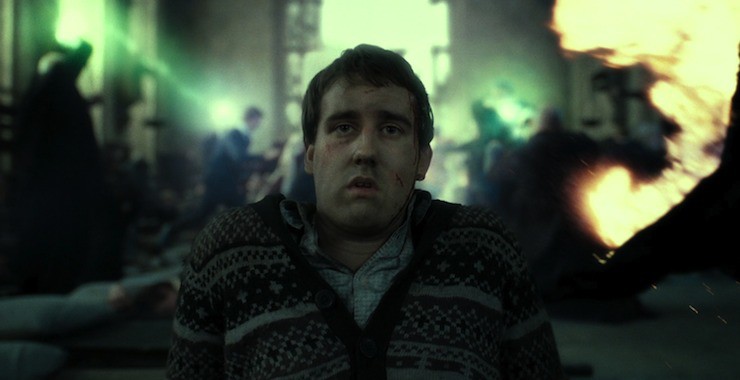
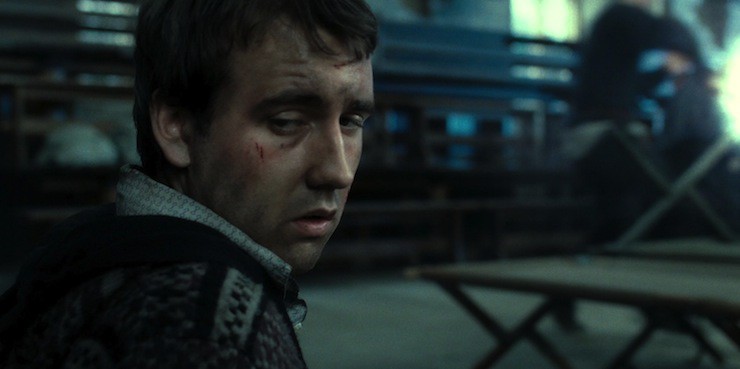
But then Harry just sort of jumps up and the sword of Gryffindor appears and everyone starts running around. The battle in the castle is pretty sloppy, and it’s such a mistake that they wait to let Neville kill Nagini later when Ron and Hermione are in danger. They basically rob Neville of that deeply important moment in favor of getting excited over Harry’s revival, which is a poor choice because Neville has just beautifully rallied the troops and effectively defied Voldemort. The moment was there, and in retreating from it, the battle loses momentum.
Instead, we get this weird chase scene through the castle where Voldemort keeps generating silky-scarves off of his robes and trying to strangle people? What. What the hell is this? Why did this seem like a good way to articulate the final action? Then he sort of materializes and Harry’s like “Tom, it’s time to finish this the way we started this—TOGETHER.” And then he high dives them both out of a window, and I’m like is Harry attempting double suicide, there seems to be literally no cogent plan here whatsoever.
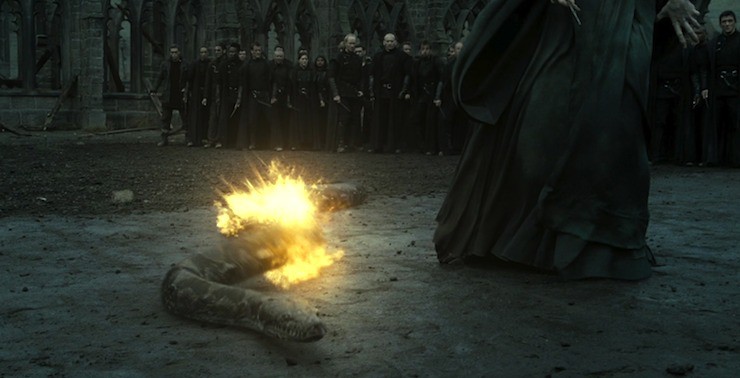
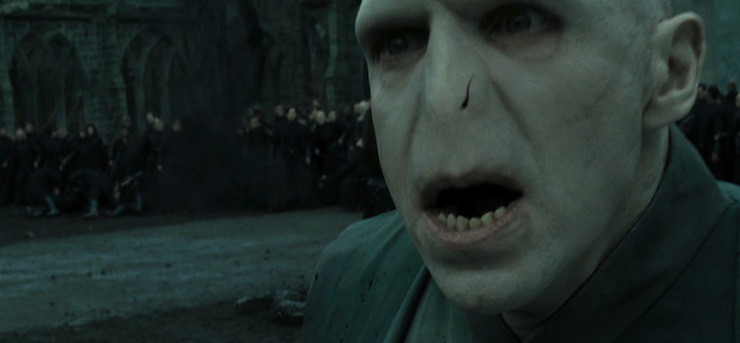
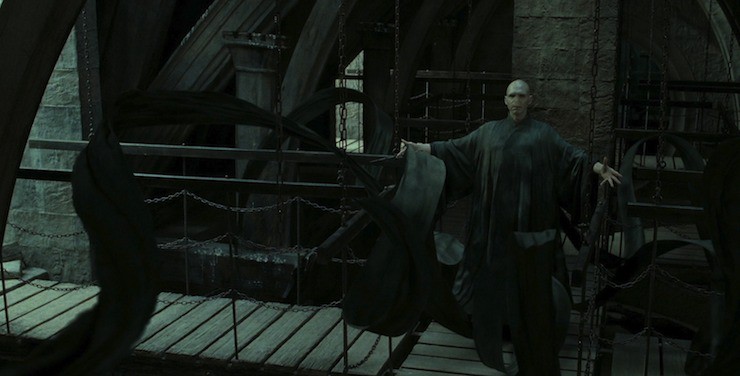
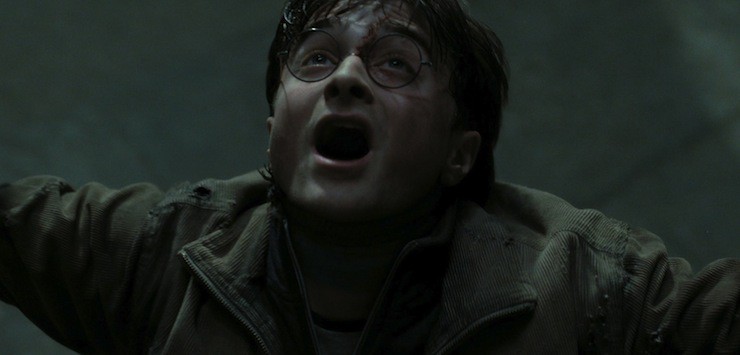
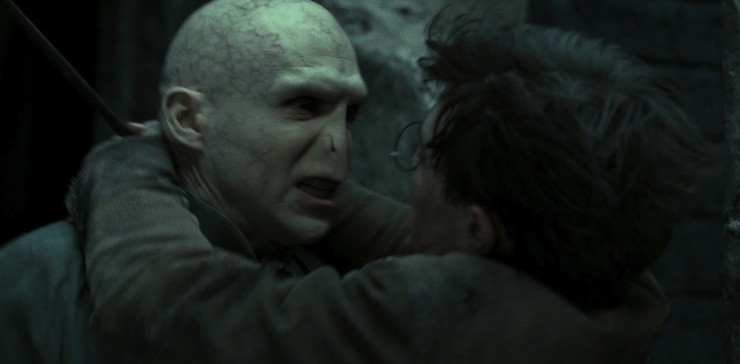
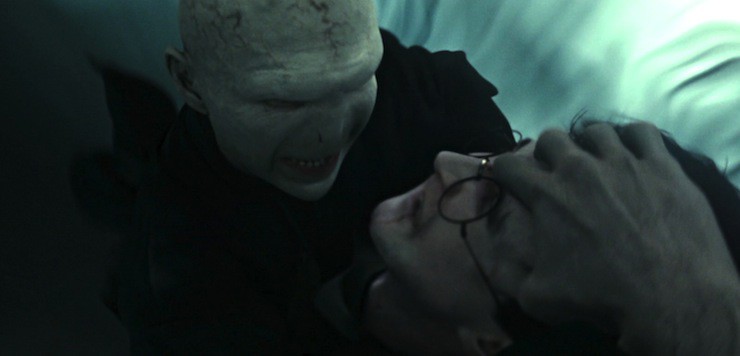
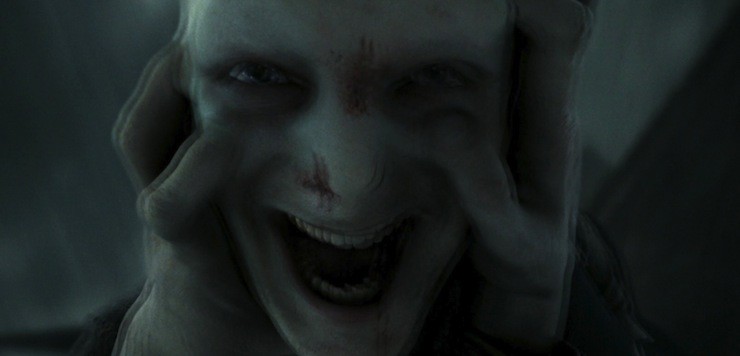
Then they’re in the courtyard alone, and they duel with a great big stream of light between them again, but it backfires and Voldemort dies by flaking off into the ether like some really bad dandruff.
There is no show of it in front of the school, no point where Harry tells Voldemort to work for remorse, not a word about the many mistakes the Dark Lord made with the Elder Wand and Dumbledore’s plans. There’s no real showdown. It just ends with some loud noises and a lot of thoughtless action. And Voldemort doesn’t die like a normal man, which really ruins all those delicious themes Rowling built up over several books.
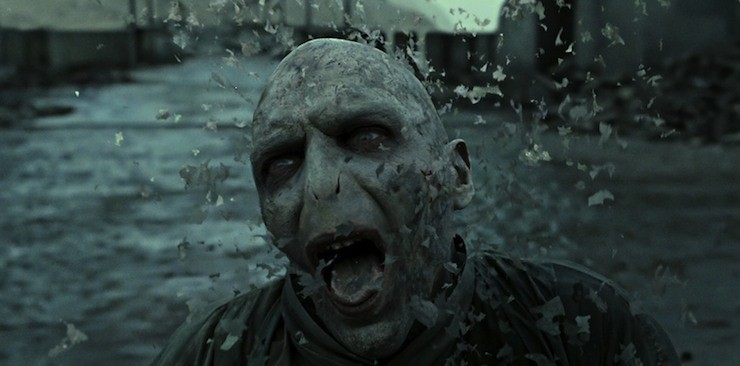
But the best is yet to come, when Harry tells Ron and Hermione all about the deal with him being master of the Elder Wand. And he never repairs his own wand with it, but he does break it in half and chuck over the side of the castle bridge. IT’S THAT EASY FOLKS. Want to get rid of a very powerful magical object that has been haunting generations of users? No big deal. Just snap it in half with your hands. Then clap your hands together and call your work as Chosen One complete.
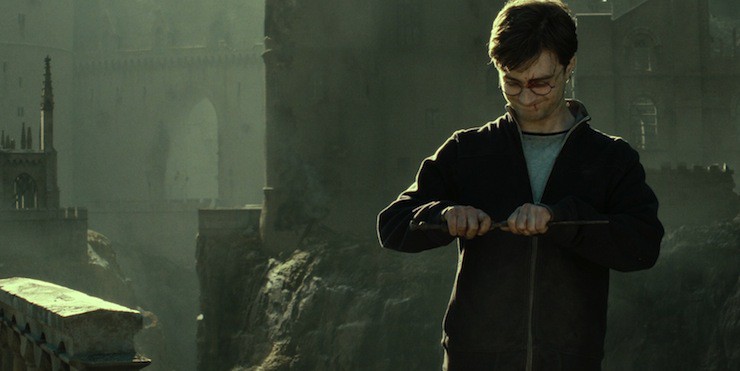
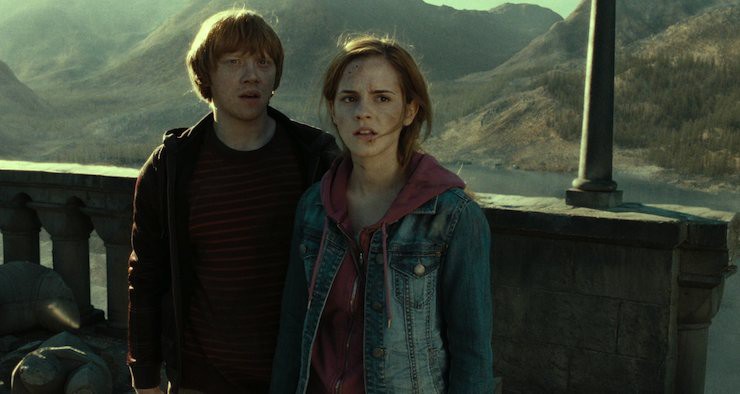
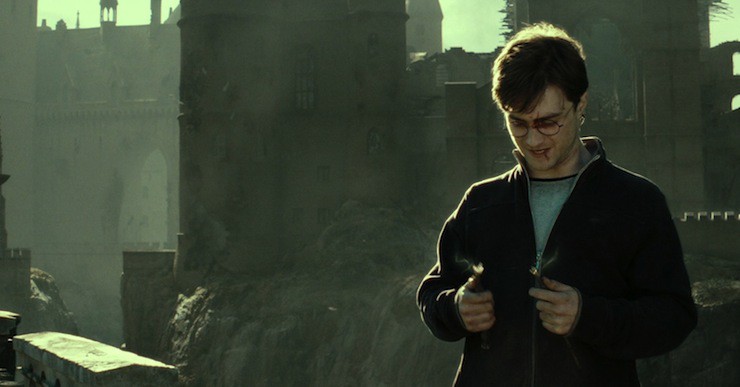
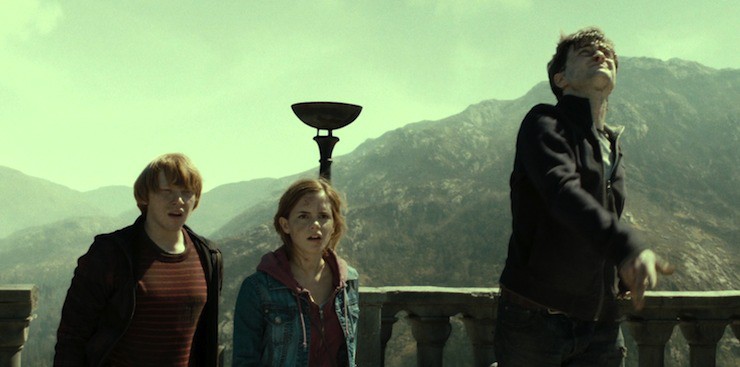
We get the epilogue, which is mostly the same as it is on the page, with necessary omissions to prevent too many name drops at the end of the film. The kid who plays Albus is adorable, and Radcliffe plays the part of loving dad exceedingly well for a guy barely out of his teen years. Some people thought the age makeup didn’t do much to them, but the alternative was reportedly very over-the-top, and made everyone look more like sixty-year-olds. Ginny doesn’t get the chance to comfort Harry as the train is pulling away because she’s been ignored through most of the film. So that’s great.
So it ends the way the book ends, but it doesn’t? It’s still one of the better endings that these films have had.
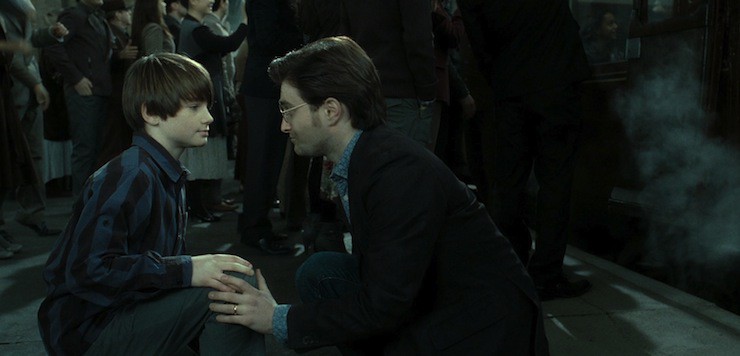
For all its flaws, there is still much to applaud in the final film, at least before the very end. Part 2 needed to feel like an event, and it absolutely did. But it was strange to say goodbye to all of this. The movies played alongside the release of half the book series, and we spent the better part of ten years with these actors, taking the journey next to them. Potter was unique in that regard, as it was in practically every aspect. And with a brand new film at hand, and a new installment on the way in theatre format, it continues to be.
We’ll just have to see what comes next.
Emmet Asher-Perrin still basically shrieks when Harry snaps the Elder Wand. You can bug her on Twitter and Tumblr, and read more of her work here and elsewhere.










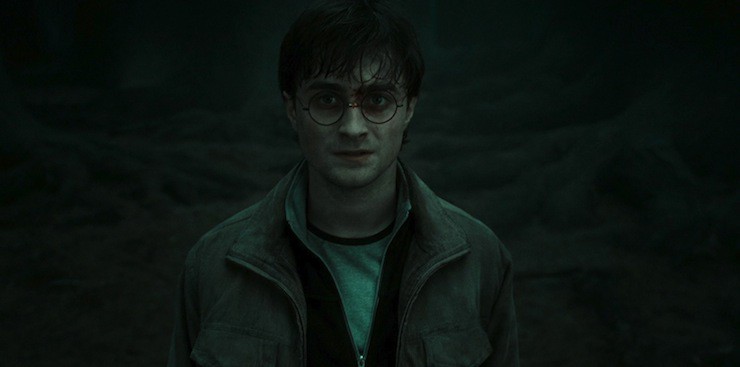
Emily, thank you for your dedication to the re-reads and re-watches. I enjoyed your commentary on the chapters/films. They set the ground work for additional comments.
I agree with you 100% with the decision not to have Neville killing Nagini right after he makes the speech. IMO, Voldermort seeing Nagini die unhinges him even more. The way it plays out in the film, we do not know what, if any, effect Nagini’s death/destruction of the Horocrux has on Voldermort. I also agree with you Neville’s movie speech was more inspiring than his book speech.
Thanks for reading my musings.
AndrewHB
Ah, Emily. These posts have all been so good, I’m going to miss them.
I have to say, though, I just about fell off my work chair, laughing at “anger over snek fyre”. Are you sure you don’t want to recaption the movies? Because I would read that, too, if you did.
Harry breaking the Elder Wand is actually one of the few things I liked better in the movies than the books. It just seems SO risky to leave the Elder Wand intact and also where somebody could theoretically find it. Can Harry really count on nobody else piecing together what happened? I know it seems improbable, but…I guess I’m just paranoid.
But yes – otherwise I really agree with you on a lot here – while this movie is more action packed than the previous one, it loses something in the way it glosses over some of the big themes (like Voldemort ending up a corpse) and adds a bunch of bombastic stuff that just doesn’t need to be there. And Neville really should have gotten to slay Nagini right then and there.
As for Snape – I was finding it pretty hard not to sniffle during that whole part (as well as the part where Harry uses the Resurrection Stone). One thing that was interesting to note is that in the flashback Snape doesn’t first just ask for Lily to be saved – his first instinct is for all of them to be saved. But that just goes along with the general ‘softening’ of his character in the first place, as they also omit his dropping the branch on Petunia, Lily’s concerns about his death eater friends, and their fallout after he calls her Mudblood.
While I hate to criticize Alan Rickman, I do think his dramatic pauses were way too hammy this time around. It almost became a parody of itself.
Speaking of the sobbing baby in your caption – when this movie came out my husband and I went to see it on our very first trip out by ourselves after our son was born. He would only have been a few months old. So of course I’m already feeling a bit nervous about it, and then there’s this incredibly emotional scene of a mom saying goodbye to her much loved child, and then said child sobbing forlornly all alone. :( :(
Oh – one other thought. I HATE that Fred didn’t even get a proper death scene. (Nor do we get to see Percy’s reconciliation with his family).
I did like this one; but for me, the best thing was the venue — by coincidence, we just happened to be in London shortly after it had opened there, so what more appropriate place to see a Harry Potter movie than the Criterion in Picadilly Circus? (At least, I’m pretty sure that’s where we went.)
I lived in Bar Harbor, Maine when this one debuted, and thus had the misfortune to watch it in a theater that specializes in fancy pizza, sitting in the center of a room packed with chomping people. Unable to endure the noise, I left during intermission and only saw the second half when the DVDs came out many months later. Thus, I remember very little of it. Er…I liked McGonagall animating the armor and statues and saying she’d always wanted to do that. And when the dragon eats the goblin and someone says “That’s unfortunate.” Not so much the Chamber of Secrets scene with the oddly clean, articulated basilisk skeleton. Not that anything about the basilisk made sense in the books either.
Without all the Pensieve flashbacks, how did film-Harry know about the cup and locket? I’ve forgotten.
That you for a great reread!
I’m pretty sure I can’t get all my feelings about this movie out in a post like this, but. I’ll give it a go.
First, Emily, THANK YOU so much for this delightful reread. I have enjoyed it immensely and will probably reread it.
Now, to sum up this movie, I’ll say that I will occasionally play it, starting at Ariana’s portrait, to the end, just for the elevated feels.
Low points for me include: slytherins in the dungeon, chamber of secrets, dead snek timing, Harry and Voldy battle. Really irritated by that last, BTW.
I do love the deleted scenes where Harry slips into line with Ginny (which had to be cut to preserve the surprise) and Tonks shows up to fight with Lupin.
Now, good stuff:
Bella-ception! HBC as Emma as HBC as Hermione as Bellatrix was absolutely superb.
The ‘Horcrux sound’ was a nice touch if you hadn’t read the book.
The explosion of joy as the trio emerge from the portrait and the amazing Seamus joke about Harry vs Weasley bros.
Harry facing down Snape. ‘You’ve still got a massive security problem.’
mcGonagall. Could not be any better. The teachers and the protective spells make me cry, too. It’s perfect and beautiful.
Yeah? You and whose army?
Harry Potter! You listen to me right now!!
the walk from the Penseive to Voldemort is my very favorite part of the entire movie. Hermione’s courage and selflessness reduces me to helpless sobbing. Harry’s family from the Resurrection Stone is exactly what he needed, exactly what I wanted, perfectly beautiful.
Neville’s speech, man. Neville.
Heres what I like and hate about how the Malfoys are treated here: a book reader can be proud of them for finally seeing the value of love vs power, can applaud them for walking away from wanton destruction, can understand the choice the family makes. A non-reader thinks they are simply cowards. It’s a disservice.
Not my daughter, you bitch!
I forgot, I like the talk at King’s Cross, but I wish there had been more info, as in the book. Oh, well.
That’s all, folks! Thanks again!!
Knew I’d forget something; sorry about the double post.
The disappearing sword was a great touch.
I agree completely with all these notes! I really really really hated the happy-fun-time jump ride that Harry & Voldy did – it seemed it was only added due to the fact that there were some studio execs that gave some notes that said – we need a action chase-like scene that will really play up the whole IMAX-3D-ness of the film. Why don’t we go crazy and add this scene for no reason? ACTION!
Blargh.
Also – I agree with commenter #3 – Rickman’s flashbacks were a bit hammy. Theres tons of memes out there of that ‘ham’ and ‘OH THE FEELS’ dramatic poses.
Also – why couldn’t they have used the Shrieking Shack for when Snape dies? They used some Boathouse? wtf?
In pondering this film’s deviations and omissions relative to the book, I felt that I finally recognized several of the filmmaker’s editorial choices and how they caused major alterations. The largest change was towards a more Hollywood-style heroic arc, i.e. ensuring Harry develops into the Chosen One who actively defeats rather than outwits/outlasts Voldemort; nearly as big was the decision to pretty much ignore the overarching themes (the power of love and the acceptance of death). These decisions were in place across all eight films and not only resulted in some of the final-film weirdness but also impacted the adaptations of (at least) three key characters.
Snape ends up more firmly in the tragic-hero category. Mainly that’s due to Rickman portraying him with all the brooding bitterness but almost none of the loathing. But this film takes it to the next level by implying that Lily’s murder primarily affected Snape, breaking his spirit and inspiring him to atone and avenge; the event’s impact on Harry is briefly mentioned in the first and fourth films but pretty much ignored in DH2. This take on the story isn’t exactly wrong per se but significantly alters the character dynamics.
Ron’s characterization also suffers from the shift towards Hollywood adventure-hero tropes. Book!Ron from the get-go provides not only natural exposition but a steady stream of tactical advice, the latter being essential in making the Trio as a unit more effective than any of them individually. But the exposition is mostly unnecessary on the screen, and the films emphasize Harry as the Hero with the skills, so Ron ends up downgraded towards Plucky Sidekick (plus comic relief).
Ginny fares worst, mainly because Book!Ginny’s most active contributions to the cause nearly all occur away from Harry’s presence. (Except for the two Big Damn Kiss scenes that were ready-made for the screen with minimal alterations…and so of course were severely altered for the films. o_O) In the last book especially, JKR uses Ginny as an effective foil illustrating Harry’s contrasts with Voldemort regarding love, sacrifice, and death, most especially when her arc intersects with those of Snape and Lily as Harry sacrifices himself in the forest. If you make HP films that ignore the bigger love/death themes and never use any cinematic tricks to get inside Harry’s head, then you’ve essentially written Ginny out of the story; no wonder her portrayal was so limited and uneven.
As the finale to an action-adventure film series, DH2 was impressive and easily the biggest on-screen spectacle of the eight. I thought it presented a number of book elements spot-on: the dragon, McGonnagal’s mustering of the statues and suits of armor, Harry’s use of the Resurrection Stone, and the sound of Ginny’s voice when she thinks Harry’s dead. But it really cemented the notion that the films are an alternate reality to the books, which was slightly disappointing. That will be a useful mental note for future viewings.
The thing I found very odd in the movie is Luna in the Room of Requirement. It was like she came out of nowhere. Thinking about I guess she could’ve made her way to Hogwarts while Harry Ron and Hermione “rob” Gringotts. Also I did find it odd that Harry mentions Remus son, when there is no mention that he was going tho be a father or Harry and the other were informed. It may be inferred in Part One when Tonks says has something important to say and is cut off that she and Remus are expecting.
Thanks, you really brought the series to life, I mean I’ve read the books a few times and seen the movies once or twice each, but you made it so easy to relive those experiences. Thanks.
@@@@@ 9 – I’m pretty sure the boathouse is used so that my rowing friends and I could get drunk one night and discuss how psychotically dangerous “bumps” (a type of rowing race typically done on narrow rivers, where boats line up in line astern with about a boatlength and a half separating them and the goal is to hit the boat in front before the boat behind hits you) would be if coxes had wands. Particularly bearing in mind that some of the crews in this type of race have centuries-old rivalries.
The Black Lake would be a non-standard environment for this sort of race, but if it has any rivers running into or out of it…
If anyone wants to see how dangerous this type of racing is even without magic involved, search Youtube for “bumps carnage”. Then wonder how anyone will insure any of the boats involved.
HISHE really sums up the heavy handed bumbling that was the last two movies for me: “I’m going to kill you Harry Potter! I’m pointing my wand at you as hard as I can!”
Matthew Lewis grew up to be so handsome. Like a young Clive Owen. And it’s terrible that what they did to Helen McCrory’s hair distracted from her amazing cheekbones. It took me forever to recognize her as Narcissa Malfoy when I watched her on Penny Dreadful.
My absolute favourite of the entire series was Julie Walters as Molly Weasley. I find re-reading the books Julie Walters makes Molly better, she embraced and owned the mother trope so well. And ‘Not Mah Dotter, you bitch!” (and the self-satisfied, ‘damn right’ look on her face afterwards) was pure awesome.
I came to Potter via the films, so never minded them the way many readers-first did. On the other hand, I’m sorry I missed out on the first wave, and knowing what it was like to find this series in the books, and to see it BECOME before the movies began. It must’ve been truly something to be a part of that.
Ah well, nevermind. I was there for Star Wars back when, and the kids today can’t have that!
I’ve made my major complaints earlier; I’ll make a couple of minor ones. (1) Hardly any Tonks; the deleted scene would hardly have made it more difficult for the theaters to squeeze in multiple showings (which I gather was the major reason for cutting). (2) Too little Ginny; having looked at the posted screenplay I gather there was more of her on the bridge with Neville. And I really regret her not being on the grounds as Harry was leaving. I gather from that screenplay that she was originally supposed to be there, and Desplat’s “Harry’s Sacrifice” segment suggests how it might have gone. If you haven’t heard it, it’s about half a minute longer than the music actually used, and uses a quote from the heartbreaking “Obliviate!” in Part 1, drawing an explicit parallel between the sacrifice Harry is making and the one Hermione made when she made herself an orphan. Everybody gushes over John Williams; Desplat’s score is my own favorite.
Emily, thank you for the wonderful months of the re-read.
Now for the rant that I have been raging about for years.
I tried real hard to understand the many compromises needed by Mister Kloves to
turn the books into a screenplay. I have even managed to come to terms with the
butchering of my favorite book, (TGoF) into what I consider the worst movie of the series.
BUT when Harry destroys the Elder Wand without repairing his Phoenix Wand,
I just lose it. Twenty lousy seconds max to do the act.
Truly ruined the end of the movie for me.
I hate the goblins for the severe, casual abuse of their dragon. I get that dragons are dangerous creatures, and that goblins have their own morality, but the raw treatment the dragon exhibits, and his cringing over the Clankers, breaks my heart every time.
Great work, Emily. Anyways, did you ever see my comments and questions?
Agree with Ian @10 (and so many others) about Movie!Ron and Movie!Ginny vs the book versions. Also agree with Emily about how well the actors coped with fame and fortune so young. Given how many child actors in the US crashed and burned I wonder if this is a UK vs US cultural thing.
The movies overall? How would I rank them? Hmm. Certainly differently than the books. I liked all of them. Prisoner of Azkaban may be my favorite, followed by Goblet of Fire (helped that I’d read the book before seeing the movie). Then Order of the Phoenix (have trouble reading the book because Dolores Umbridge may be a more evil, or more realistically evil, villain than Voldemort). Sorcerer’s Stone and Chamber of Secrets I saw before I read the books and I liked them well enough to start reading the books. Then Half-Blood Prince and Deathly Hallows (1 and 2 together in my mind).
Thank you Emily, for your recaps, comments and emotions. I thoroughly following this reread/rewatch with you. Didn’t always agree with everything, but that’s of course the point: it’s personal. And you did very well.
Thank you.
I always like the choice to keep the elder wand in the world. Part of it was acknowledging that these artifacts are part of the wizarding world, and that so far, even the dangerous are still kept around. It also leaves the books with a sense that things aren’t over, that there are stories left to tell, and Harry’s will always be ready to be a part of it.
@9 I seem to remember reading somewhere about the filmmakers’ decision to switch Voldemort’s killing of Snape from the Shrieking Shack to the Boathouse. Because of the the way they had designed the Shrieking Shack in the earlier film, they could not shoot the scene in DH2 effectively in the way they wanted, and so had to come up with an alternative setting.
Seeing the dragon of Gringotts affected me more than the book, which is unusual. Maybe I read the book too fast, but the movie protrayal was definitely done well.
Where Eagles Dare is a pretty good combat soundtrack.
Alan Rickman was an excellent actor, and Snape was th most nuanced charcter in the series and film. Even deeply flawed people can have bad things happen to them.
And I like how Rowling let him know some needed future info, and this reinforces how glad I am she kept story control. Normal practice would have meant directors making whatever chianges they felt was necessary, and damn the rest of the tale.
Radciliffe, Watson and Grint have been rewarded with a boatload of money; more impressive than medals :)
Gambon is good, but I wonder how Richard Harris would’ve done.
Agree on the messing up the Nagini slaying and Voldemort death (see, directors love changing stuff), but the rest of the battle was alright. And be glad the Epilogue didn’t put the guys in 70s mustaches.
Thank you so much Emily for this series!. I didn’t comment much, but I immensely enjoyed reading each entry.
There were a few clunkers here and there in this movie, but there certainly were so many memorable scenes and images.
I still have a lingering qualm over what was actually going on with poor Lavender Brown, though – was she dead? about to be eaten?
I’m sorry to see these recaps end, but it’s been such a blast reading them every week! You’ve really changed the way I look at some of my favorite books, and now I love them even more! Thank you so much for that.
I don’t mind Harry snapping the Elder Wand at the end of this movie. For me, it feels in line for Harry’s character to just casually dispose of the Super Powerful Magical Artifact, and shows one of the key differences between him and Voldemort. Harry doesn’t have that power-lust that Voldemort has, and he knows that it will only cause trouble down the line. That being said, HE SHOULD HAVE FIXED HIS WAND FIRST! Now he has NO wand! Harry, you’re smarter than this!
Could it be possible for you to find someone who had never red Harry Potter series to do a read? I know such a person would be hard to find but it would be wonderful to read the comments from someone who does not know what it going on, it would be like reading the series for the first time again.
@29 Chinoiserie: maybe you would like “Mark Reads…Harry Potter” which is indexed here. This is by someone who managed to get to 2010 without reading any of the books, and had an interesting view on how he thinks they might go…
He’s currently reading Diane Duane’s “Young Wizards” books aloud on YouTube, with her blessing and with interspersed comments, and it’s all going really well…
My impression with lavendar was that she had her face eaten off. In the books, Rowling makes a point of having Ginny, i think, say it looks like Ron is eating her face (when ron and lavendar are dating). Rowling tends to seed her books with humorous, yet awful lines that come back to haunt us later (ie: Voldemort saying to Wormtail that most people would give their right hands for his job. He wasn’t joking.)
Gosh I have enjoyed these so much! It just so happened that I stumbled upon your recaps as I was doing my annual re-read of Harry Potter, and it enhanced this year’s read immensely. Thank you so much for taking the time to do this!
How come no one mentioned my favorite scene, which is when Harry says goodbye to Ron and Hermione before going to the forest? It was a deviation from the book and I’m not saying the book should have included it, but I really like it. Hermione’s reaction is very moving.
Emily, why aren’t you responding to me? :(
Once I saw the Goblet of Fire movie, I knew right away that the remaining story lines and direction was going to disappoint me… The nail was hit on the head about Neville killing Nagini right away and in front of Voldemort… We don`t get to see the effect of Harry`s sacrifice in which Voldemort couldn`t hurt any one… we don`t get to see voldemort dueling 3 people, we don`t get to see the EPIC speech that had been culminating over 7 books where Harry`s talks down to Voldemort in front of everyone, seeing the doubt and horror that voldemort (to me) began showing during their convo… the duels that we shown in the movie weren`t good IMO…. the duels in the order of the phoenix, again IMO, were much better aesthetically. All in all the movies just didn`t do the story justice… I understand that there is an IMMENSE amount of information within the books.. but I believe the director and creeator of the movies focused too much on the wrong areas and interpreted them in the wrong way (ie. voldemort`s death)
Might sound haterish… but I loved the story, the nuances, the characters, how everything tied together, that the deathly hallows was the peak of the battles, the culmination of so many things we thought insignificant or a one-off which in the end played their roles. The movies missed the mark on a lot and I was disappointed.
The movie was pretty good overall, but there was this one thing that was just kind of stupid in the movie. You see at the very beginning of the movie all the students marching into the school as Snape is overlooking the scene. In total, it looked like there were less than 100 students. When chaos erupts, however, you see all these students in the background just running around wildly that make no sense whatsoever in where they’re running. The part when Harry is running up the staircase and Luna is trying to get his attention makes me laugh every time. This tiny ass staircase in this massive castle had about 75% of the student body run by Harry in this 30 second scene. I’m sure they found plenty of volunteers to be extras in this movie, but it’s really stupid how they made these extras in the background just running around mindlessly especially at the quantity of students you saw regardless of what part of the castle the scene was taking place.
I know I’m just splitting hairs by criticizing what extras are doing in the background, but since it occurred in multiple scenes, I can’t overlook how dumb it is every time I watch the movie. You mean to tell me these students voluntarily went to Hogwarts despite it being run by a death eater and had the school’s headmaster murdered there the year before, but run around like headless chickens when the school comes under attack? At least give them a purpose as to why half the students are running one direction and the other half running the other direction.